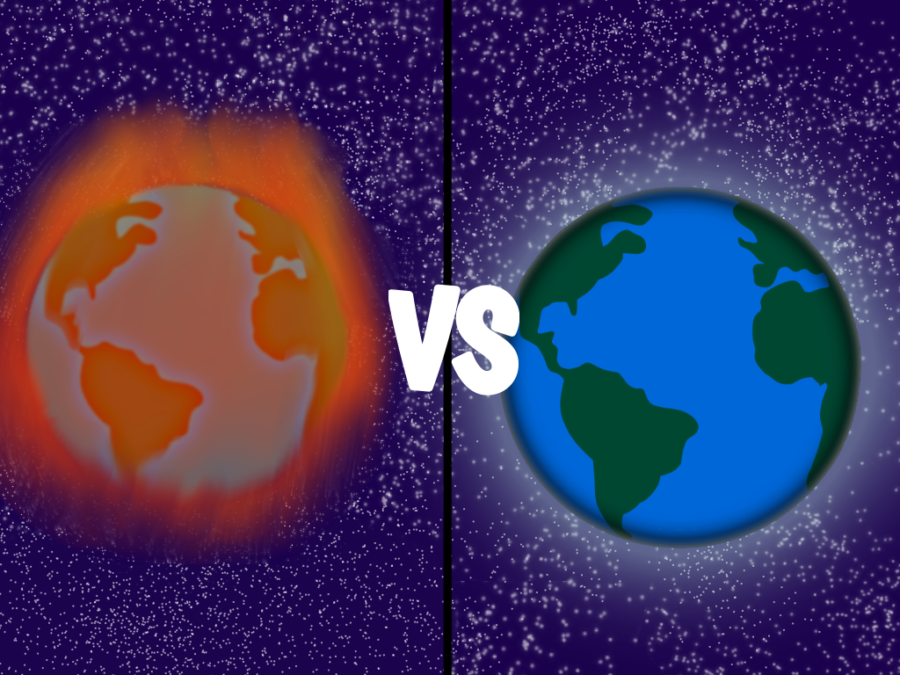The Controversy: How can I be sure it’s real?
August 27, 2020
It’s a debate we’ve all heard of and probably all weighed in on: is Climate Change fact or fiction? Original artwork by Evanthia Stirou.
Any writer has to be aware of the consequences of an article on the topic of Climate Change meeting a readership that may see it differently. According to a survey conducted by Yale, only 69% of Americans believe in Climate Change.
While this is the majority, that still leaves 31% of Americans who are undecided or who completely reject the veracity of Climate Change. Therefore, it’s crucial to get the other viewpoint and allow sources from the 31% to have an opportunity to clarify their opinions.
According to one anonymous Saint Stephen’s student, “Statistically speaking, the last two winters we have had have been the coldest winters Florida has seen in a long time. That makes it hard for me to believe that global warming is even real.”
To speak to this, there’s a reason scientists prefer the term climate change to global warming. Though there has been a general trend of warming over the past few decades, that doesn’t mean it’s the only thing happening. Climate change means that the weather trends will be more extreme than before, so looking at Florida’s cooler winters, or even the polar vortex over the Midwest (a current of cold, arctic air), those are actually proving the existence climate change rather than disproving it.
According to wri.org, as glaciers melt, they send polar, arctic air southward, and that is why things seem to be cooling down in the winter even as they heat up the rest of the year.
A few other sources reiterated that there’s just not enough evidence yet to make conclusions about changes in the climate. But this is not necessarily true. It is useful to check out this page on NASA’s website for evidence and statistics on the impacts and statistics of Climate Change.
Not only does NASA insist that Climate Change is an issue to be taken seriously, but senior officials in the U.S. Armed Forces recognize its veracity and state that it must be planned for as an issue of national security.
General Joseph F. Dunford Jr., former Chairman of the Joint Chiefs of Staff, said, “When I look at Climate Change, it’s in the category of sources of conflict around the world and things we have to respond to … it is very much something that we take into account in our planning as we anticipate when, where, and how we may be engaged in the future and what capabilities we should have.”
The truth is, maybe it would be easier if the non-believers’ evidence against Climate Change was stronger. While going around asking people why they thought it was a hoax, some part of your humble writer was secretly hoping that they would say something that resonated or made sense.
It would be much easier to not believe in Climate Change, because then people wouldn’t have to worry so much about it. Maybe that’s why people choose to disregard the science behind Climate Change— it’s easier for them to not have to deal with the scary facts at hand.
Nobody wants to hear that Climate Change will be irreversible by 2030. Nobody wants to hear that polar bears are going extinct, or that coral reefs are dying. Nobody wants to hear the harsh reality, because it’s easier to be cushioned by one’s worldview or political stance.
Dr. Suprenand likens the controversial status of the issue to a visit to the doctor.“If you go to the doctor and they say that you’re sick, it doesn’t matter if you believe them or not. The truth is, if 99 doctors tell you that you’re sick, then you probably are.”
In this case, the doctors are the scientists and the diagnosis is Climate Change. If you trust your doctor, shouldn’t you trust the scientists like Dr. Suprenand?
“I’ve done the work, I’ve had the education, I’ve done the research,” Suprenand said.
